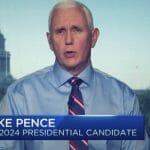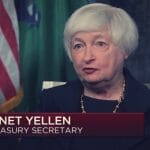JPMorgan’s Dimon Bullish on the U.S.
Jonathan Golub, UBS, weighs in on JPMorgan chief Jamie Dimon’s upbeat comments on the U.S. economy.
Transcript:
watching that one. the markets may be concerned about the fiscal cliff and a weak economy but during that speech today that we just heard at the council on foreign relations, jpmorgan’s ceo jamie dimon says the u.s. is still the best place to invest. this attitude somehow how woe is me, how terrible, america’s lost — it’s just not true, folks. hopes to who travel around the worle have the best military on the planet, we will foryears. we have the widest, deepest, most transparent capital markets in spite of what happened. they’re still the best — i’mtalking about in all of its glory, asset management, venturecapital,equity, markets. we have the best businesses on the planet, small, medium and large. is he right? joining us, invest strategy specialist at ubs, jonathan golub. i half-share his sentiments. are we the best player on the world stage today to invest? i think probably yes. on the other hand, we do havethese fiscal overhangs and it is not just a political issue. we have substantial government debt and fiscal imbalances thatneed to get addressed and that mean that we’re a slower grower than we’ve been. would i rather be here than anyplace?yes, i would. we have a sell-off on wall street today. you tend to take a longer term some of this is being linked to the doom and gloom about earnings season and — or expectations of doom and gloom of earnings seasons. that’s been out there for awhile. how much of that is factored in to the market and how much of it do you believe? i think some of it has been factored in. the important thing is we actually expect earnings to belower in the third quarter this year than it was in the third quarter of 2011 by about 4%. that’s not a good thing. i think what the market is selling off today on is a couple of specific company reports. cummins provided some negative statements, as did alcoa, basically said things are not only ugly now but are likely to stay ugly for a period of time. i think you’re right, if we lookbeyond this earnings season, i think the real issue issomething like 4%, 5% earnings growth next year. not as good as it’s been in the past but not a disaster. we have the election coming up and everybody’s handicapping what the market will do depending on what the outcome is. do you play in that game? i mean have you thought about it? what are your expectations? obviously we have thought about it. let’s first talk about where the expectations are. the good news is — at leastgood news for tv folks is we now have a real race. i think a few weeks ago the expectation was obama’s in office, there’s no real election. now it is getting very, very close. the key is a surprise will move the markets. romney will be positive for themarket. not only because of less regulation and things like thatbut also the fiscal cliff debate will go better with romneybecause republicans will probably own both houses ofcongress and the presidency if romney wins. to me that’s — over the next three months or so, that’s the most important issue.what if mr. romney does not win? if mr. romney doesn’t win,effectively you have status quo. we think the fiscal cliff debategoes much worse. first you don’t get the romney bounce, you probably get a bit of a sell-off on that. the bigger issue is the end of this year, i think it is going to be the summer of last yeararound the debt ceiling debate. i think it is going to be realreally ugly. what areas of the market do you like with the longer term view past the election? right. if you look out beyond just the election and fiscal cliff issues, i think the key is, if we’re in a slower economic environment, 1.5%, 2%, 2.5%, you need companies that underline earnings growth. you’ll find that in a variety of areas, you’ll find it in good staples company andtechnology companies. but being able to identify that to me is more important than simply buying dividend yields. as far as specific sectors are concerned of the defensive sectors, we would really rather rather be in staples or health care, more than utilities which we aren’t really a fan of. tech has really taken it on the chin lately, but there is the ability to grow in a weakenvironment for technology stocks. jonathan golub, thank you for joining us today.
Jamie Dimon: Not Worried About JPMorgan, Worried About Country
Jamie Dimon, CEO of JPMorgan, discusses current banking regulations, and says “we have to accommodate all of the new rules and regulations, and we are going to do it,” he says, and that “we should do these things right for the future of the United States of America, not for JPMorgan.”
Transcript:
if you talk about — i think to your point, dodd-frank, i think 25%’s been done. it is being fought in the courts now. huge — i think — it is really hard for me to calculate a number but i’m going to tell you it is going to cost us, overhead, well over a billion dollars.we get rules from brussels. a lot of these are contradictory, overlapping. all i want at one point as we sit down and have aconversation, what do we really immediate for safety andsoundness and all that and what’s creating unnecessaryburden. that burden is going to be higher the smaller you are, in my opinion. i’m not in favor of that. i don’t want to hurt community banks. they have a great role in life. i just think you need collaboration to get it done. it is just not going to get doneproperly if we’re just always fighting with each other. the most important — capital and liquidity. and there are 398 other rules.but you should know we’re trying to work with everyone toaccommodate — weave no choice. i mean we have to accommodate all the — we are going to do it and we’ll do it in a way in the spirit and letter of the law. that’s what we’re going to do. that doesn’t mean we won’t comment on it because regulators get very mad at me when i xwhent comment at all.we will comment. but the end of confers should be, forget jpmorgan. we’re going to be fine no matter what. believe me.i’m not worried aboutjpmorgan. i am worried about the country.we should do these things right for the future of the unitedstates of america, not jpmorgan. time for one last one here. let me apologize in advance to the many people with their hands up. it is just demand exceeds supply. well known market problem. mr. dimon, thanks. garrett mitchen and i write themitchell report. i want to ask you arguably a too big to fail question but this is not about jpmorgan chase or barclays. it is about the u.s. and china. china is on the brink of a majorchange in its leadership. it has written its own sort ofprescription for new economic directions which they know theyhave to initiate or they, too, will fall off the cliff. we may or may not be looking at a major change in leadership in this country. but we are looking at the fiscal cliff and i wonder from yourperspective asomebody who does business all around the world and despite your protestations about not really knowing much about politics, how you assess the relative chances of success moreme arica dealing in the short term with its fiscal cliff and longer term with its ability to get some semblance of good governance and with the chinese to be able to do the same and make the changes in their economy so that the two largest economies in the world will help things stay online.china has huge issues it’s got to deal with. okay? there are really two. they’ve got to broaden out their democracy.remember our democracy started as white men over a certain age owned property. 90 million people in the communist party voted. they’ve got to broaden it out. every society in the middleclass decrates some form of democracy over time and it ishard. they’re worried about losing social control and unrest.they’ve got to broaden out their economy. think of the financial system and the spin wheel. it’s not the most important thing in an economy but where investors of all type — pension funds, insurance, individuals meet through vehicles of all type to invest in projects and companies, start-ups, venture, r & d. they can’t macro manage down the reed. they have two huge things to gothrough. we as the united states sho help them do that. it is in our interest that they grow peacefully, that they can take care of their 1.3 billion people, et cetera. there are going to becomplaints. but hank paulson had that strategic economic dialogue — we have to do that. it is the right thing to do. america will have the — america’s might, in my opinio is based upon three things. economic power, which is the foundation of all other things and all jobs and all buildings and all — i know when i see some of the people standing in front of the hoover dam — the government. that was actually built by bechtel. it was your taxpayer money. the know-how usually comes out of american business. i checked who built the space ships that land on the moon. it was a predecessor to boeing. these are collaborations through government and business and economic and military are directly related and the united states will be the militarypower for a long time period, as long as we’re the economicpower. i thinm the moral power of the united states is called freedom and democracy. and human rights and rule of law and those things. we shouldn’t forget that. you go to china, they look at america, they say how lucky we are to have those things and the businesses and why are we complaining so much about our situation? they have a much tougher one. but i think we should help them but make sure we’re strong. we should never give up on our strengths — which i said are economic, military around moral. folks, thank you very much. appreciate it. thank you, sir. jamie dimon taking questions after a long ranging interview covering a number of topics at the council on foreignrelations. ty, he is always very frank, outspoken,colorful. but things tt stuck out to me in this was he re-affirmed the fact that he thought that the united states was the best place on earth to invest right now. he said that basically europe doesn’t have the way yet to get out of their mess, altugh they do have the will to a certain extent. a lot of very interesting comments also about what regulation is costing his bank every year. and some of his themes are es that are familiar to those who have followed mr. dimon in certainly recent years. one of them is the need forcollaboration and not antagonism between business and government, specifically business and the federal government, and that he saw the real benefits. he concluded there on the idea that it was a aboration, basically, between the federalgovernment and a predecessor of boeing that put a person on the moon 40-some years ago. and those are interesting points, a theme that he has struck many times and it is one of the things that i think has entered into this life-long democrat’s relationship with the current administration. it’s where he has parted company with them. it’s going to be interesting. he says he’s not interested in running for public office. but you just wonder whether or not he wouldn’t accept a treasury secretary position if indeed one was offered under either administration.yeah. he was certainly explicit about that in his comments in vanity fair magazine, that he dn’t want it, i shall not seek, nor will i accept — but on the other hand hank paulson didn’t want it either but he took it because of the financial situation the unitedstates was in at the time. exactly. now to bertha coombs who’sbeen following the remarks of jamie dimon and has some of the excerpts and overview for us. one of the interesting thingswas the issue of bear stearns that came up. of course, jpmorgan bought bear stearns on the eve of the company perhaps needing to file for bankruptcy, facilitated by the fed, and now jpmorgan is being sued in a civil suit over some of those derivatives that bear stearns sold. asked whether he’d do it again, he says — it’s a close call but he also specified, we wereworking with the government, we were helping the fed out.listen. we were asked to buy bear stearns. it was not as if the fed did us a favor. no, we did them a favor. had they gone bankrupt, all of these lawsuits would be no money. there would be no lawsuits. i’m going to say we’ve lost 5 billion mr. to $10 billion on the bear stearns things now. yes, i put it in the unfaircategory. overall he says it is unfair that they are being looked at as having benefited from it had when clearly now this is goingto be something they have to deal with. interestingly, he was making all these wide ranging comments. he’ll be talking to analysts on friday when jpmorgan reports
Jamie Dimon Speaks About ‘London Whale’
“Businesses make mistakes, they learn from it, and they get better for it,” said JPMorgan CEO Jamie Dimon talking about the “London Whale” debacle, reports CNBC’s Bertha Coombs.
Transcript:
what is jpmorgan doing to help faith bases organizations borrow to immediate our capital needs over the long term. right now is a good climate for us, for example. my mon sthaer is 1,600 years old. we want to borrow now and pay it over time.how much you want to borrow? what rate? that’s a great question. we bank governments not-for-profits. i know we bank churches. i just don’t know the actual numbers. i’d be happy to share with them if d me an e-mail. that’s what we do, advisepeople, what’s reasonable and not reasonable. a lending business, banks, unlike other institutions, often has to say no.sometimes we say we’re not going to do it and it is not good foryou, either. like selling someone too much liquor or letting them have that fifth drink at the bar. send me an e-mail. taking a slightly broader answer to that question, take a minute, talk about your definition — here you are this large organization, you have enormous profits. what is your sense of corporate social responsibility? what sort of program — what does jpmorgan define for itself — i’ve never had a conflict over this. my job is to build a healthy, vibrant company. and i want — in every community you operate in, including greece, italy and spain, for to you think we’re a good corporate citizen. no different — i really mean this — than that corner store. that corner store participates in the community, they help the little league or local church. they participate, give people summer jobs — that’s jpmorgan’s ceo jamie dimon making news this hour. he spoke on a wide variety of issues before the council on foreign relations. monitoring the whole discussion taking place. you have some of the headlines, bertha. one of the things that struck me, he said that anywhere on earth if you could pick a place to invest, it would be the united states. that would be the strongest place that you could put your money. and also he said, businesses make mistakes in addressing the london whale issue. he said that’s what business is about. you make yotakes and you learn from them. he also sort of says, in a way, that government is headed towards making a very big mistake.jpmorgan’s jamie dimon, never one to mince words, speaking at the council of foreign relations in washington this morning.he warns legislators that going off the so-called fiscal cliff is an unacceptable option for the nation and the economy. there are all these potential outcomes. i would defy any one of you toreally know what they are. therefore, it is irresponsible policy just to say, let’s see. let’s not see. i mean risk management says let’s try to avoid that. dimon says he has even biggerissues with the tone in washington regarding americanbusiness right now. if you think that washington and business can go to war with each other and it is going to be good — terrible error. i mean collaboration is what should happen. we should have had collaboration. we were in a crisis. every busy know wanted help to get things done and would have pulled together, worked around the clock but it became a war. now we’re relitigating parts of those wars. dodd-frank and health care. it’s all being relitigated. on the issue of collaboration, he talked about what’s going on o in europe to try to stem the debt crisis. and he said, you know, the thing about europe is it has the will but not the way. we have the way. but not the will. we are going to keep monitoring it. in this discussion. we’ll bring you headlines and perhaps dip back into that discussion as news warrants.
Jamie Dimon Addresses Fiscal Cliff
Jamie Dimon, CEO of JPMorgan, says the economy would have been booming if the U.S. would have adopted Simpson-Bowles.
Transcript:
Bear Deal Not Fair: Dimon
JPMorgan CEO Jamie Dimon says his company was doing the US government a favor when it obtained Bear Stearns. The fact that the government is now suing his company over Bear’s losses falls into what Dimon would call the “unfair category.”
![Jamie Dimon of $JPM on Fiscal Cliff, Bear, USA, the Whale & More [VIDEO] Jamie Dimon of $JPM on Fiscal Cliff, Bear, USA, the Whale & More [VIDEO]](https://www.valuewalk.com/wp-content/uploads/2021/07/clost.png)











